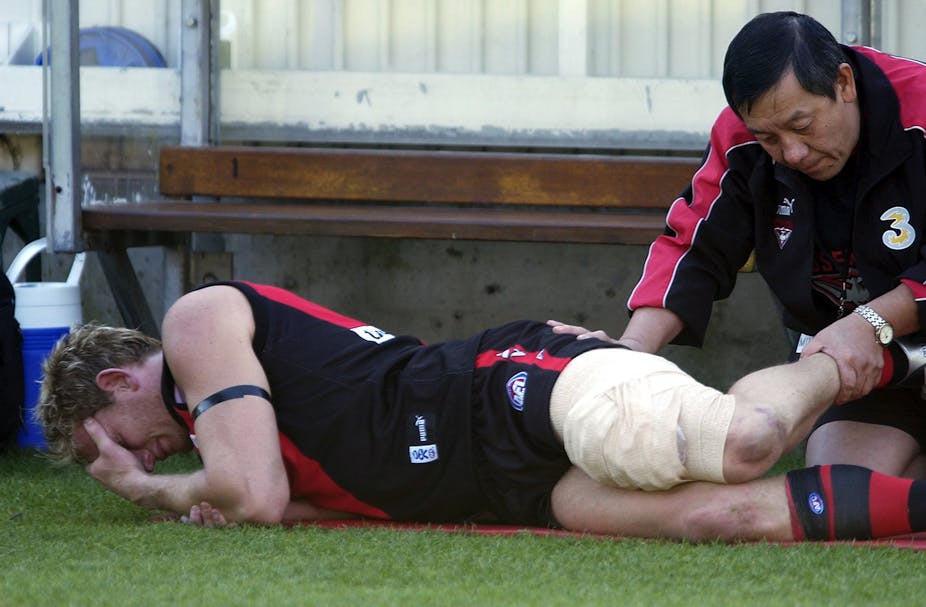AFL club Essendon has so far avoided the imposition of any sanctions by the Australian Sports Anti-Doping Authority (ASADA). Yet the investigation into the activities of the club, especially the supplements program allegedly involving injections to the stomach of players, remains ongoing.
While the principle of innocence until guilt is proven remains, the Bombers are still a long way from walking out the proverbial front door, their heads held high. They are not the only AFL club under investigation, with Geelong and Gold Coast also facing questions from ASADA.
Journalist Caroline Wilson speculated recently on the Channel 9 program Footy Classified as to the implications of Essendon being found guilty of breaching various elements of the ASADA code. They are potentially disastrous not just for Essendon FC and some of its players, but for the whole AFL.
While it is important to re-iterate that no such breaches have yet been found or admitted, it is also worth investigating what might happen to the competition if penalties like six month or even two year bans are imposed on players and coaching staff.
As it stands, such an outcome is still a definite possibility.
Stripping points
As a recent article by Roy Masters outlines, a deal had been mooted with ASADA whereby Essendon escaped sanction while the Cronulla Sharks received a six month ban.
The AFL has yet to strip a team of a premiership or deprive them of the opportunity to play for premiership points or suspend them from the competition, but the National Rugby League has stripped the Melbourne Storm of two premierships and required it to play out a season without receiving points.
ASADA is an agency of the Commonwealth, so it is subject to Commonwealth administrative law, but it relies on its contractual arrangements with individual sports to enforce its recommended sanctions.
The ASADA Code requires that individual players be sanctioned for taking banned substances. This seems unfair in the case of the Essendon players, who had reason to believe that they were being administered the substances in the course of their employment.
If anyone is to be sanctioned, it should be the club that allowed the treatment to take place. Yet ASADA and the World Anti-Doping Authority (WADA) is clear that players must take ultimate responsibility for what goes into their bodies: ignorance is not a defence, no matter how unfair it may seem.
The letter of the law
There is a massive issue of due process here. Essendon players (and indeed the Cronulla players) have returned no positive tests for banned substances. Yet Lance Armstrong never tested positive either.
In keeping with the approach of ASADA and the Australian Crime Commission when they went public with their allegations, ASADA is trying to negotiate guilty pleas and implication of others in return for imposition of light sanctions.
Proper process is to investigate, lay charges and have the charges heard by an independent tribunal. ASADA attempts to be both prosecutor and judge, recommending a penalty to the sport’s governing body which that body then imposes.

Essendon and its players are yet to be charged, let alone found guilty. However the ASADA code allows for an Anti-doping Rule Violation “ADRV” to be found against an athlete even without a positive test.
If there is some sort of plea bargain, the AFL may indeed seek to impose sanctions mid-season. The ASADA code focuses on individual guilt, so it is not clear whether it could sanction the club as a whole. Individual players could be suspended and Essendon could perhaps field its VFL team, though it would then disrupt the VFL. This would also require the approval of the AFL Commission and the other 17 clubs.
In the event Essendon are found guilty …
Essendon might withdraw from the remaining games, unable to field a team. This would clearly affect contractual arrangements for the staging and broadcast of matches. The AFL might allow Essendon to continue to compete but without the possibility of further premiership points, as occured with the Melbourne Storm.

It is hard to see how they could be stripped of any points already won as the AFL is allowing the club to compete while under investigation. In any case, any sanctioning of the club should be in relation to the 2012 season when the alleged violations occurred.
The AFL certainly has cause to regret signing on with ASADA. Threatened with the withdrawal of federal government funding if it did not sign on to the WADA requirements, the AFL felt its hands were tied. The richest sporting organisation in the land may yet come to bitterly regret that decision.
No winners in a tawdry saga
The ASADA code does not seem well adapted to dealing with club-approved doping as it is geared to punishing individuals.
The least disruptive method would be for the players to serve a six-month ban during the off-season, but this would bring ASADA further into disrepute. It would also call in question natural justice - if players are to be punished, surely they must miss matches?
This is an opportune moment to take a good look at the operations of ASADA, which is affiliated with the WADA, headed by Australia’s own John Fahey.
It has the power to destroy not just individual careers but whole teams and indeed competitions. While the investigation into Essendon and Cronulla for injecting their players with substances that may not have been banned at the time has been a wake-up call to clubs, ASADA’s powers and investigative methods would benefit from an injection of due process.
One thing is for sure. The AFL, and especially Essendon, would like this whole sorry business put to bed as soon as possible.

